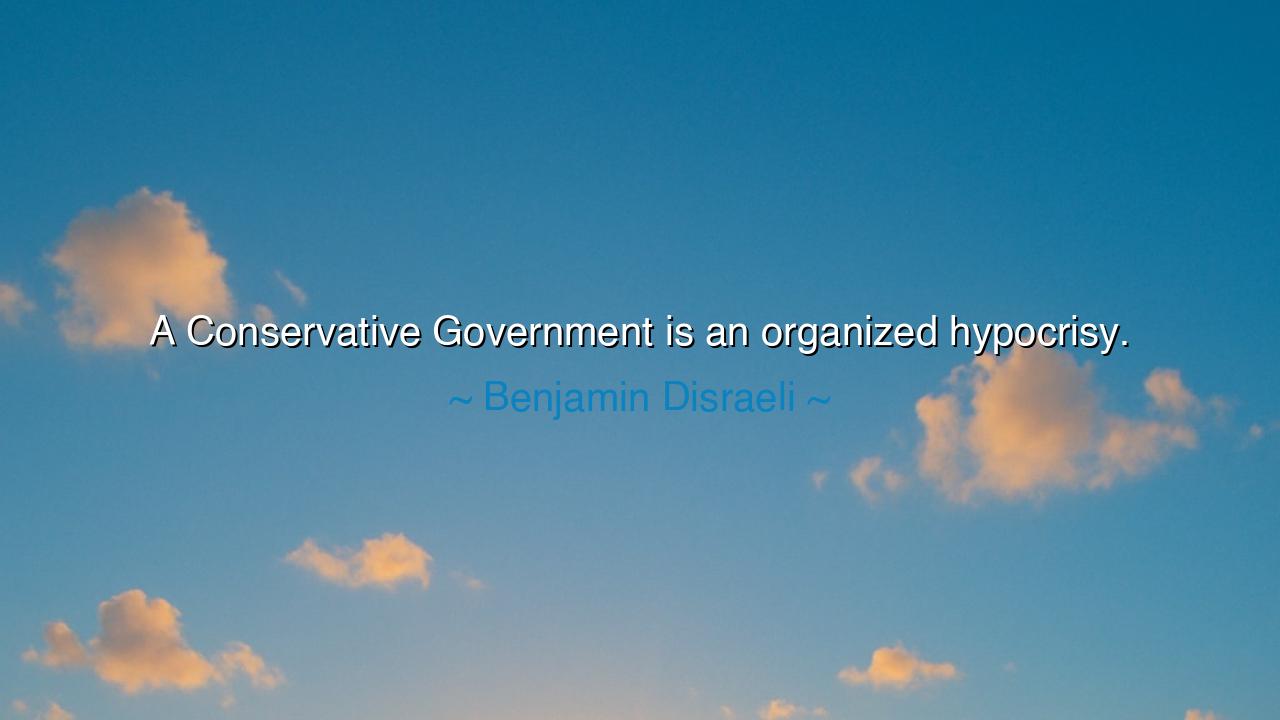
A Conservative Government is an organized hypocrisy.






When Benjamin Disraeli declared, “A Conservative Government is an organized hypocrisy,” he was not merely delivering a barb of wit against his political rivals — he was unveiling a truth about the eternal tension between principle and power, between what governments say and what they do. Disraeli, the master orator and philosopher of British politics, understood that politics, for all its noble words, often bends before the winds of convenience. His statement is both an accusation and a warning — that when a government claims to preserve tradition and virtue, yet acts to serve its own interests, it becomes a machine of hypocrisy, clothed in respectability but hollow in spirit.
The origin of this quote lies in the fierce political battles of 19th-century Britain, when Disraeli, a Conservative himself, wielded words as weapons in a field dominated by class, privilege, and power. Some historians attribute the phrase to his criticism of certain conservative factions that resisted reform while claiming moral superiority. Disraeli saw through their pretense. He knew that a government that claims to stand for stability while refusing justice, or that cloaks self-interest beneath the veil of patriotism, ceases to be conservative in spirit — it becomes corrupt in soul. His words echo like the judgments of the prophets of old: a government without integrity is no government at all, but a theatre of deceit.
To understand the depth of his meaning, one must first grasp the nature of hypocrisy. Hypocrisy is not merely falsehood; it is the masquerade of virtue — the use of noble words to conceal ignoble acts. In calling a Conservative Government “organized hypocrisy,” Disraeli exposed the danger of political systems that elevate appearances above truth. A government that preaches morality yet tolerates injustice, that speaks of liberty yet serves only the powerful, that invokes religion while ignoring compassion — such a government is hypocrisy incarnate. Its organization, its order, its decorum — all serve to disguise its betrayal of the very values it professes to defend.
History abounds with examples of this tragic pattern. Consider the ancien régime of France, where kings and ministers proclaimed themselves defenders of divine order and tradition, even as they crushed the poor beneath taxes and indulgence. Their hypocrisy was not disorganization but precision — a system so refined in deceit that it seemed eternal. Yet when the people awakened, when truth pierced the veil of hypocrisy, that “organized” order collapsed in fire and revolution. Disraeli’s words might well have been carved upon the ruins of Versailles: a government that hides injustice beneath the robe of tradition will one day be stripped bare by the wrath of the oppressed.
And yet, Disraeli’s quote does not condemn conservatism itself, but warns against its corruption. True conservatism — in the sense of preserving what is good and enduring in a civilization — is a noble pursuit. It seeks order, continuity, and wisdom. But when this desire for preservation becomes fear of progress, when it resists reform out of pride or greed, it decays into hypocrisy. The wise leader must know when to protect and when to change, when to hold fast and when to let go. For as Disraeli understood, no government can claim to conserve virtue if it refuses to confront vice.
This truth can be seen even in the modern world. Time and again, we witness leaders who speak of morality while enriching themselves, who praise democracy while undermining its institutions, who invoke patriotism while dividing the people. These are the inheritors of Disraeli’s “organized hypocrisy” — governments that have perfected the art of deception, where the image of righteousness replaces the practice of it. Their speeches resound with virtue, but their hands are stained with the quiet ink of betrayal. And yet, history assures us: hypocrisy is a brittle crown. When truth rises — through the courage of citizens, the persistence of justice, or the revelation of time — the mask shatters, and power stands naked before the judgment of history.
The lesson of Disraeli’s words is not only for rulers, but for all who hold responsibility in their hands. Beware the comfort of hypocrisy, for it is the easiest sin to justify. The falsehoods of others are visible, but our own self-deceptions are cloaked in reason and rhetoric. Governments, families, and individuals alike fall into ruin when they speak of virtue but act from vanity. To lead well — in politics, in business, or in life — one must align word and deed, intention and execution. Integrity, though difficult, is the only foundation that does not crumble beneath the weight of time.
So let Disraeli’s wisdom echo through the corridors of power and the chambers of conscience: a government that would endure must be honest, even when honesty costs; must reform, even when reform risks; must act not for favor, but for truth. For hypocrisy is the polished mask of decay, but sincerity — though rough and imperfect — is the face of lasting strength. In this balance lies the fate of nations and the dignity of mankind: to speak not as actors upon a stage, but as servants of truth, whose governance is not organized deceit, but organized virtue — steadfast, humble, and real.






AAdministratorAdministrator
Welcome, honored guests. Please leave a comment, we will respond soon